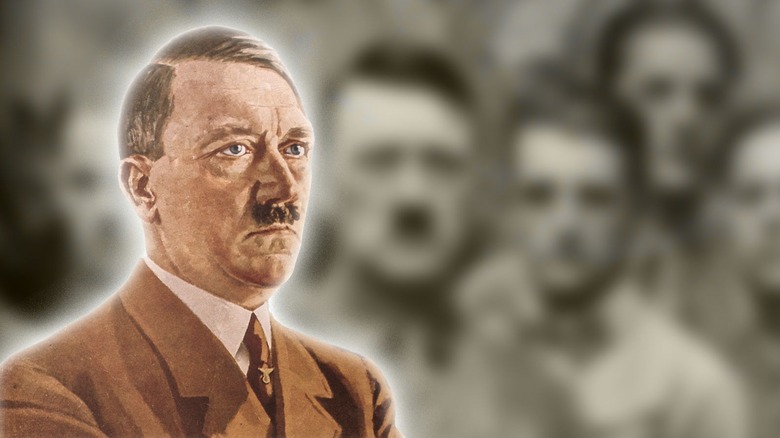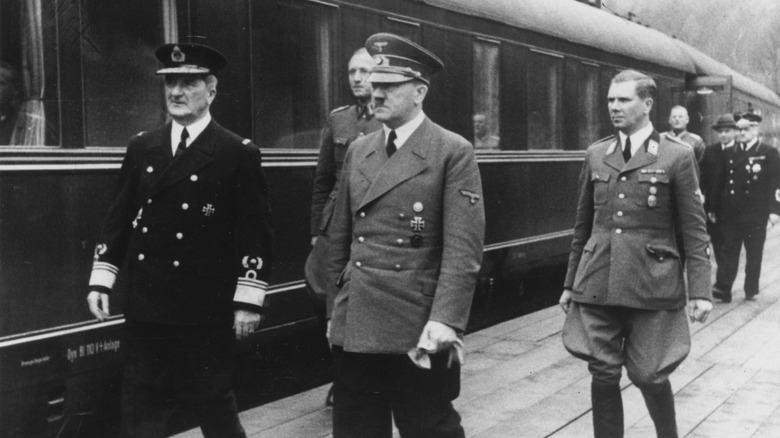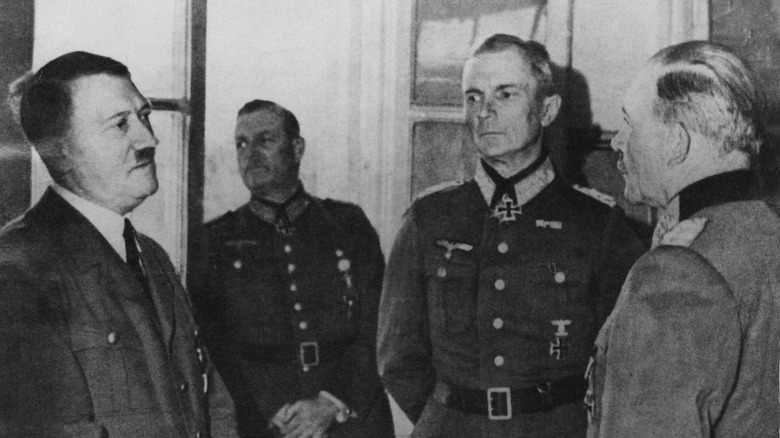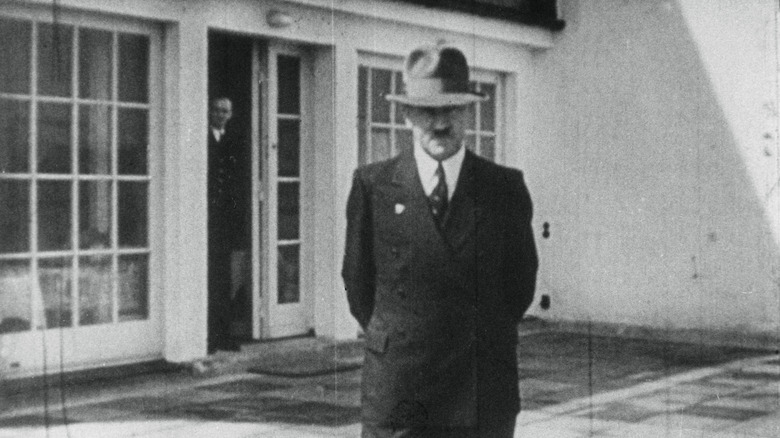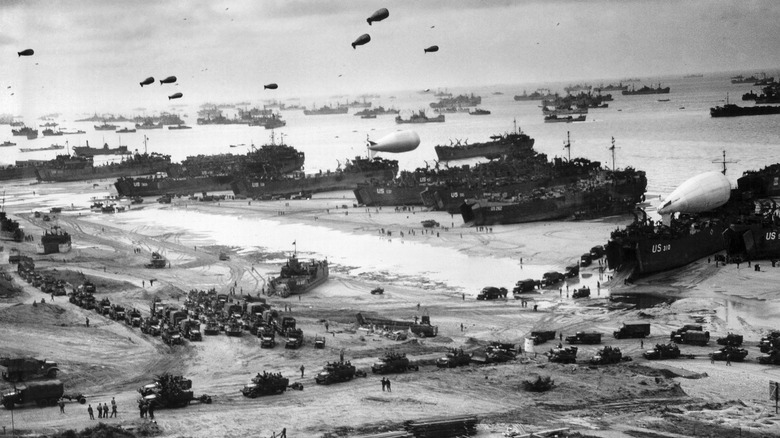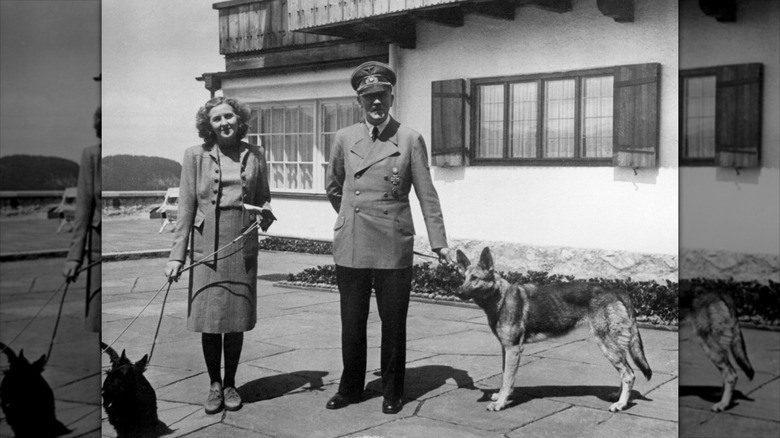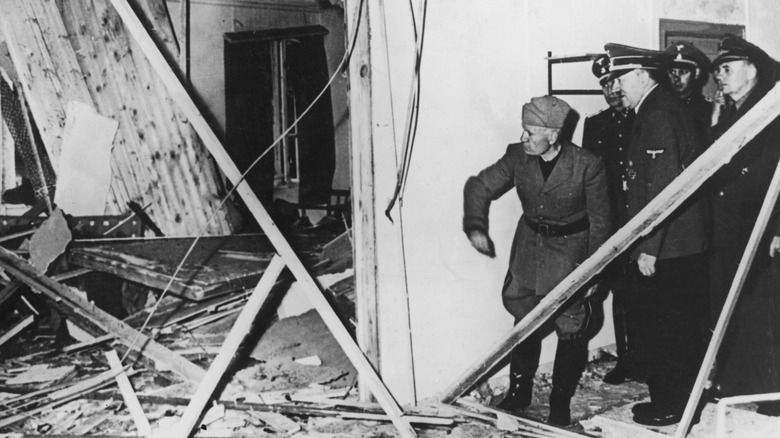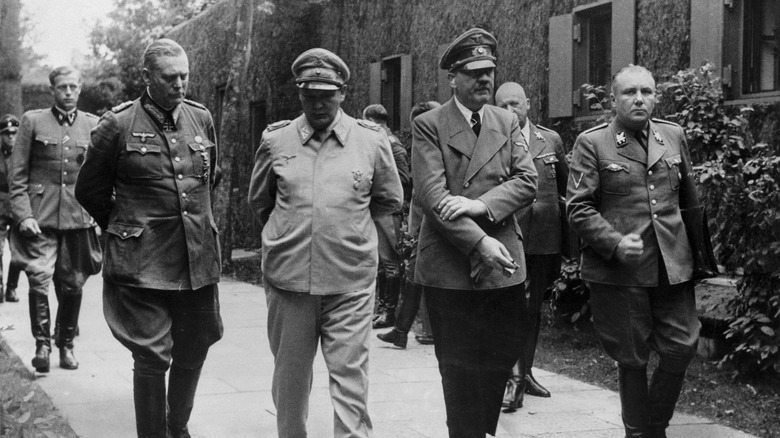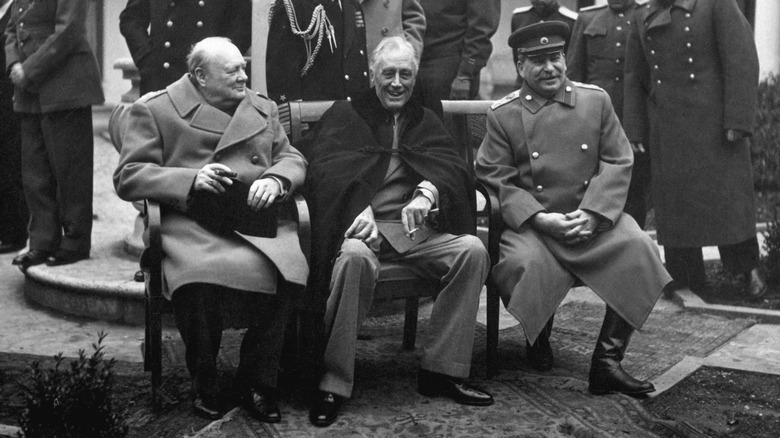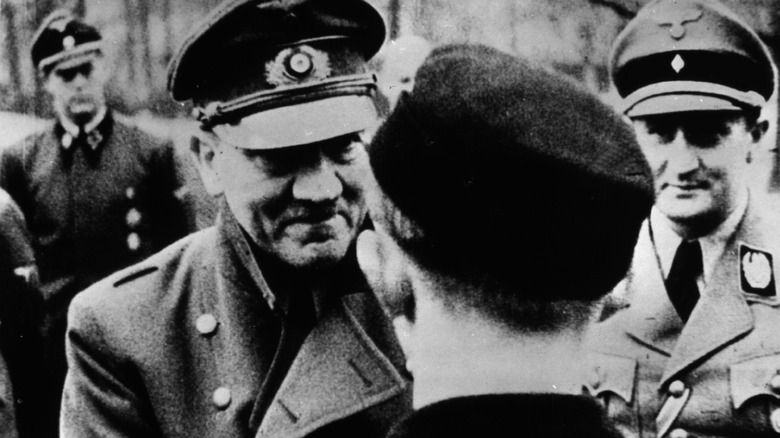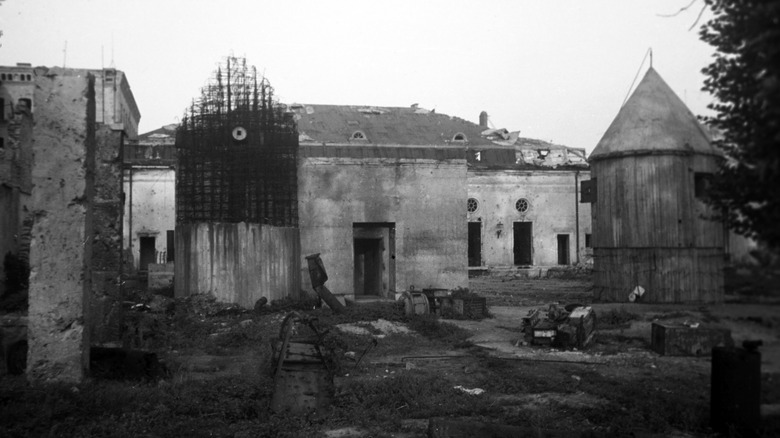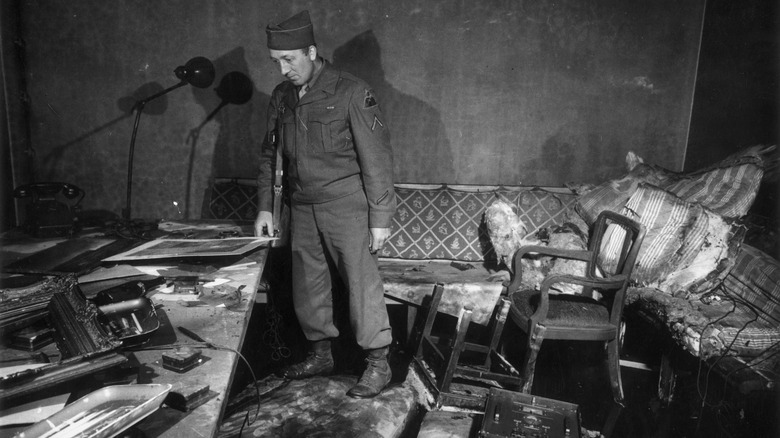What The Final Year Of Hitler's Life Was Really Like
Adolf Hitler's life is certainly one of the most minutely analyzed of any person in history. Everything from his childhood to his military service to his dream of being an artist has been poured over by historians. And those were all things that took place before he ever even joined the Nazi Party, let alone took over Germany. There is seemingly not a moment of his time after he became Führer that is unaccounted for or contains even a little bit of mystery.
For years, Hitler had a meteoric rise, succeeding at crushing first Germany and then Europe under his boot. But it's easy to be a megalomaniacal dictator when everything is going your way. Once the war started going bad for the Nazis, their leader started to crack. For that reason, perhaps the most interesting part of Hitler's life to look at is his final year. How did this psychopath handle things as the walls were closing in, as his world got smaller, and as the chance of a German victory slipped further and further away? And how did the few remaining people around him deal with him as everything fell apart for the Third Reich? Hitler died by suicide on April 30, 1945. Here is what the final year of his life was really like.
Hitler still believed he could win the war
It's up for debate when Adolf Hitler knew he would lose World War II. But if you go by what he was saying to the citizens of Germany and those in his inner circle, the answer seems to be "he realized a whole lot later than he should have." The German military was already on the defensive by the beginning of 1944, but Hitler's New Year's speech to his soldiers was about how things were going to turn around any day. They just had to not give up, and victory would be theirs.
By April 1944, exactly one year before Hitler's death, anyone who knew the reality of Germany's situation had to admit the war was looking completely unwinnable. But in an off-the-cuff speech to some of the highest-ranking members of the Nazi Party, Hitler continued to insist they were just facing a small setback. Those who knew him best, including Joseph Goebbels, recorded that this wasn't just an act, but something Hitler truly believed deep down.
Up until at least the summer of 1944, Hitler told anyone who would listen that Germany would have a comeback. And as this became an increasingly ridiculous statement, he stopped trying to use facts and logic. Instead, he began insisting that a German victory had to happen because it was what God wanted.
His health problems got increasingly worse
Adolf Hitler was a hypochondriac, but he also suffered from many very real illnesses and physical problems. During the last year of his life, as it became more obvious that Germany was going to lose the war, both his real and imagined health issues got much worse. The last 10 months in particular saw a rapid decline.
On top of the worsening symptoms of Parkinson's disease, Hitler suffered from a heart condition, unbearable stomach issues, skin problems, jaundice, and a polyp on his vocal chord that required surgery just five months before he died. Those close to him saw a man who had aged rapidly: His hair was graying, he hunched over when he walked, and his eyesight had deteriorated. The leader had once been known for his energetic, almost frenetic speeches to the German people. By November 1944, he was so visibly unwell that he canceled a planned speech on the anniversary of Kristallnacht and had one of his underlings read a long statement instead.
To keep functioning through these ailments, he relied on his doctor, Theodor Morell, and a huge amount of drugs. Hitler's drug use during World War II was already epic, but in his final year he became more dependent on the bizarre "cures" of Morell. These included everything from methamphetamine and cocaine to poisons like strychnine to an extract made from testicles.
He disappeared from public view
While Adolf Hitler might have wanted to believe the war could still be won for Germany, his people were living in reality. They had no choice, considering many cities, especially Berlin, rang with air-raid sirens due to constant Allied bombardment. They knew that they had lost loved ones on the front lines, and they saw that more and more soldiers were dying. The news broadcasts couldn't hide the bare fact of the matter: The German military was not having many victories anymore, and the Soviets were getting ever closer.
In early 1944, Hitler gave a short speech on the radio to mark the 11th anniversary of his taking power in Germany. But he no longer captivated his audience the way he had for the previous decade, and the reaction to the speech was harsh. Hitler could tell his hold over the German public was slipping. Because of this, or perhaps exacerbating it, was the fact that he went from being front and center in German life to being hidden away. From 1944 onward, he stopped giving his famous public speeches and moved to increasingly isolated locations. Possibly due to his dramatically aged appearance, he did not even appear in newsreels regularly anymore. The Führer was so conspicuously absent that there were rumors amongst the populace that he had died.
Hitler wanted D-Day to happen
While Adolf Hitler was never able to find out when and where D-Day was going to occur before it happened, he knew it was coming. It was clear for months before the landing at Normandy that the Allies would mount a major attack somewhere in Western Europe. You wouldn't think that the prospect of repelling a major invasion would be something to look forward to, but Hitler actually wanted it to happen sooner rather than later.
During the spring of 1944, Hitler talked constantly about the inevitable invasion. The anticipation was stressful, but he told everyone that the German Army would not only be victorious when it came but thoroughly crush the Allies. He believed the Nazi victory would be so complete that both Winston Churchill and Franklin D. Roosevelt would lose power because of it.
When D-Day arrived on June 6, 1944, the Nazi command was not prepared. General Erwin Rommel was returning from a weekend away to celebrate his wife's birthday, and Hitler was asleep. Once he woke up, he was visibly thrilled at the development and got more excited as the day went on. Joseph Goebbels recorded that it was as if a huge weight had finally been lifted from Hitler's shoulders now that the inevitable had happened. The Führer was sure the bad weather would help bring on a German victory. As the day wore on, however, it became clear that the invasion was succeeding.
He entertained guests at his country home
When Adolf Hitler began to isolate himself from the German populace, he put physical distance between them. The Berghof was Hitler's mountain retreat in the Bavarian Alps, and he lived there full-time from February to July 1944. While there, he and his entourage existed almost in a fantasy world. Hitler and Eva Braun entertained his closest friends and subordinates, and they were very good at acting like perfect hosts as everything was falling apart for the Nazi regime.
Hitler slept late, sometimes until noon, and would then have hours-long meetings with his generals, where he planned, among other things, the final horrific stages of the Holocaust. But a lot of time there was set aside for enjoyment. Hitler chatted freely with the wives of his underlings, asking about their children. Joseph Goebbels discussed films with Braun. There were hikes ending with tea and cake and long dinners where any discussion of the war was banned.
There were special events at Berghof during that time as well. Braun hired a magician to perform at the retreat for two weeks, and it was noted that Hitler particularly enjoyed these shows. The final big party held there was the wedding reception of Braun's sister to an SS officer. In mid-July, Hitler left the Berghof for the Wolfsschanze ("Wolf's Lair") headquarters.
Hitler survived an assassination attempt
There were over 40 assassination attempts on Hitler, but the one that came closest to succeeding occurred on July 20, 1944 at the Wolfsschanze, a command headquarters hidden in the woods that the Allies were barely aware of. The greatest danger there came from Hitler's own officers, who had decided that if he would not see sense about how the war was going, then he needed to be removed for the sake of Germany. The fact it was attempted at all showed how Hitler's relationships with his officers had deteriorated by his final year.
A seemingly random event meant that Hitler survived the bomb attack: The device was in a suitcase, which was unexpectedly moved behind a large table leg by someone not involved in the plot. Four others in the room died when the bomb went off, but Hitler got away with hardly a scratch. He was well enough to show Benito Mussolini around the bombsite later that day (pictured).
Hitler retaliated against the plotters viciously. They were held in prison where they were tortured and given inadequate clothing and other necessities. They received show trials that were filmed so that the whole country would know the punishment that faced traitors. The judge was so clearly not interested in evidence or any legal process that the justice minister — who was nothing if not a fanatical Nazi himself — called them out for it. The result was never in doubt, and the accused were convicted and then shot by a firing squad.
He grew increasingly paranoid and isolated
Adolf Hitler's disturbing downward spiral only accelerated after he survived the assassination attempt in July 1944. While he had never been a rational human being, once he realized that some of the people he once believed were loyal were capable of trying to kill him, his mental state collapsed even further. The already paranoid Hitler shrunk his inner circle to almost no one, punishing or cutting out anyone who wasn't devoted enough. At the same time, he gave huge amounts of power to four of his most loyal commanders: Heinrich Himmler, Joseph Goebbels, Martin Bormann, and Albert Speer.
Despite what these men thought, however, Hitler was not handing over real control to them. The Nazi Party was still a cult of personality, one where power flowed from Hitler alone. Goebbels overstepped his authority early on, while Speer would later say how terrified he was even then of ever upsetting Hitler. This dynamic saw the four men involved in a constant power play, where any one of them could gain additional authority from their leader by courting more favor than the other three. From August 1944 until Hitler's death in April 1945, this was the dysfunctional political power structure in Germany as it tried to get the country's war effort back on track. It is hardly surprising that it was not successful.
He refused to enter into any ceasefire negotiations
While the Axis Powers were most famously Germany, Italy, and Japan, Adolf Hitler had brought together a much larger group of countries in a tentative alliance that held until the autumn of 1944. Then, after a series of military setbacks, particularly on the Eastern Front, many of these formerly friendly countries ditched Germany. Between August 23 and October 15, Romania, Finland, Bulgaria, and Hungary all left Germany in the lurch, either by announcing they were done fighting, signing ceasefires, or even, in the case of Romania, switching the side of the war they were fighting on. Italy had already capitulated to the Allies the previous year, and Germany was almost on its own.
As it grew clear their side was going to lose, even those close to Hitler felt the best chance for Germany was to seek peace. There was even reportedly pressure from Germany's one real remaining ally: Japan. The country believed that peace with the Soviet Union could allow German troops fighting on the Eastern Front to focus their resources on American and British soldiers on the Western Front.
In August 1944, the Japanese government began a push for peace negotiations between Germany and the USSR. The following month, Hiroshi Oshima, Japan's ambassador to Berlin, met with Hitler and his foreign minister to discuss the possibility of peace. Despite being the only real option left if he didn't want the Third Reich to be crushed entirely, Hitler never considered any such scenario. In fact, he believed that Stalin would never have accepted such an offer. By the time America dropped the second atomic bomb, the Soviet military was fighting on both sides of its country, beating Japan just as soundly in Asia as it was beating Germany in Europe.
Hitler rallied for a short time
As 1945 approached, things had never looked bleaker for Germany ... until, somehow, they didn't. In November and December 1944, things momentarily almost improved for Adolf Hitler and the Third Reich. The Allied advance in Europe had paused, which Hitler decided to take advantage of with one last military push. The idea was crazy, but by that point he was desperate. The Germans spent weeks planning a major counter-offensive in the Ardennes, one that, if it was successful, Hitler believed would not only turn the tide in Europe but might even force the Allies to sue for peace.
Hitler had also consolidated his power again after his iron grip was left shaking from the assassination attempt in July 1944. And there were rumors in the German press that the country had a secret super weapon that was almost ready. While Hitler had to know that Germany was nowhere near building an atomic bomb, he nonetheless spoke about it with an ally in August 1944 as if it were a possibility.
However, there would be no nuclear weapon for Germany, and any of Hitler's positive feelings about the future were crushed along with his Ardennes counteroffensive. Known as the Battle of the Bulge to the Allies, it was a complete failure. As the calendar turned to 1945, Hitler had no options left.
He holed up in the Führerbunker
It is possible that Adolf Hitler really believed he could win World War II all the way up until the beginning of 1945. But at that point, after the failure of the German military at the Battle of the Bulge, as the Allies continued their march to Berlin, even he was aware that his time was running out. He turned to self-preservation.
From January to his death in April, Hitler didn't leave the Chancellery building in Berlin and spent most of the time in the air raid shelter underneath it with a small group of his closest advisors. These included Joseph Goebbels, Eva Braun, and various bodyguards and secretaries. One of the latter, Traudl Junge, eventually published her recollections of those final months. She remembered Braun throwing parties with drinking and dancing, the horrible fear that came with the constant Allied bombardments, and how even the men who were closest to Hitler, including Heinrich Himmler and Albert Speer, abandoned him as the end neared. While at the beginning of the year, it was possible for Hitler to go above ground to the Chancellery building and even walk his dog Blondi in the grounds, by his final weeks, it was far too dangerous to leave the Führerbunker. He spent the last 10 days of his life underground.
He got married and then died by suicide
The day before he died, Adolf Hitler married Eva Braun, who had been with him for 11 years, in the Führerbunker. It was hardly a big event considering everyone knew the end was imminent. Their wedding officiant had never even met Hitler before. But Hitler had always said that Braun would be the one who stayed until the end, and the ceremony may have been a way of rewarding her for doing that.
The final moments of Adolf Hitler occurred on April 30, 1945. The Soviets were about to take Berlin. He said goodbye to those who remained with him in the Führerbunker, including Joseph Goebbels, and then went into a room alone with Braun. They both bit into cyanide capsules, which had been tested on his dog, Blondi, the day before. This is what killed Braun, but before giving the poison time to work, Hitler shot himself. Their bodies were burned in the courtyard of the Chancellery, as Hitler had instructed. Seven days later, Germany surrendered to the Allies.
If you or someone you know is struggling or in crisis, help is available. Call or text 988 or chat 988lifeline.org.
